The Son of God
 for intense and bloody depiction of The Crucifixion, and for some sequences of violence.
for intense and bloody depiction of The Crucifixion, and for some sequences of violence.
| Moral Rating: | Better than Average—but with many cautions—not recommended |
| Moviemaking Quality: |
|
| Primary Audience: | Adults Teens Family |
| Genre: | Bible Biography History Drama |
| Length: | 2 hr. 18 min. |
| Year of Release: | 2014 |
| USA Release: |
February 28, 2014 (wide—3,000+ theaters) DVD: June 3, 2014 |
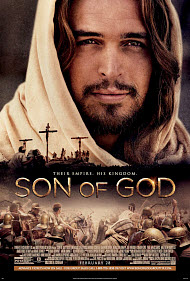


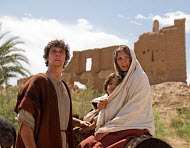
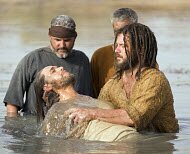

What does the title Son of God mean?
Is Jesus Christ a man, or is he God? Answer
If Jesus is God, how could he die? If Jesus died on the cross, then how can he be alive today? Answer
Was Jesus Christ God, manifest in human form? Answer
Is Jesus Christ really God? Answer
If Jesus was the Son of God, why did He call Himself the Son of Man? Answer
TRINITY—How can one God be three persons? Answer
JESUS’ CHARACTER—Is Christ’s character consistent with his high claims? Answer
Could Christ have sinned? Answer
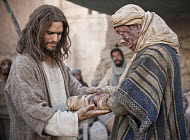
ARCHAEOLOGY—Have any burial sites been found for the people involved in Christ’s life and death? Answer

How do we know the Bible is true? Answer
How can the Bible be infallible if it was written by fallible humans? Answer

How did Jesus Christ die? Answer


MIRACLES—Has science disproved the miracles associated with Jesus Christ? Answer
Miracles, including list of biblical miracles
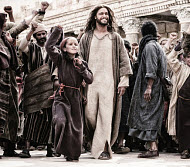
What is so NEW about the New Testament?
Why was Christ’s New Covenant viewed as a threat by some Jews?

Satan (edited out of the film)
Is sola Scriptura a biblical or a man-made concept? (Traditions vs. Scripture alone)
QUIZ—Catholicism and Protestantism.
Do you think like a Protestant or a Catholic?
| Featuring |
|---|
|
Diogo Morgado … Jesus Christ Darwin Shaw … Simon Peter Roma Downey … the Virgin Mary Greg Hicks … Pontius Pilate Sebastian Knapp … John Amber Rose Revah … Mary Magdalene Adrian Schiller … Caiaphas Andrew Brooke … Antonius Louise Delamere … Claudia Said Bey … Matthew Matthew Gravelle … Thomas Simon Kunz … Nicodemus Joe Wredden … Judas Fraser Ayres … Barabbas Paul Marc Davis … Simon Joe Coen … Joseph Leila Mimmack … Young Mary Rick Bacon … Herod Antipas Anas Cherin … Lazarus |
| Director |
|
Christopher Spencer |
| Producer |
|
Hearst Entertainment Productions LightWorkers Media Roma Downey … executive producer Mark Burnett … producer Richard Bedser … producer Eduardo Verástegui … executive producer |
| Distributor |
Christ and the Bible as interpreted by New Age Roman Catholic producers
Provided below are THREE SEPARATE REVIEWS, in an effort to cover all issues.
Review of OVERALL VIEWING EXPERIENCE—by Raphael Vera
Review of BIBLICAL ACCURACY—by Dr. Elizabeth Mitchell, Answers in Genesis
Review of HISTORICAL, BIBLICAL AND THEOLOGICAL ACCCURACY—by Justin Peters, Th.M.
OVERALL VIEWING EXPERIENCE
Reviewed by: Raphael Vera
CONTRIBUTOR
“I am John, and I was one of his [Jesus’] followers. After what I had seen, how could I not be?” And so begins the account of Jesus Christ “The Son of God.” From his miraculously foretold coming centuries earlier to his birth in an obscure village, not among the rich and powerful, but among the poor, he was both God and one of us at the same time.
John narrates a montage of scenes depicting the world since God’s creation and his reaching out to us through the forefathers of faith, including Noah, Abraham and Moses before showing us Jesus, played reverently and with a very human charm by Diogo Morgado, as he begins his ministry. After he calls his first disciple Peter (Darwin Shaw), it is mentioned briefly that he selected the rest of the twelve almost as though Peter was the only one that mattered, making it clear that this disciple will be ‘center stage’ for the rest of the film.
The religious elite, perceiving Jesus to be a threat to their authority over the people, begin to challenge him at every turn, while a nonplussed Jesus continues to do all that the prophets of old foretold that the savior, the Messiah would one day come to do:
“The blind receive sight, the lame walk, those who have leprosy are cured, the deaf hear, the dead are raised, and the good news is preached to the poor” (Matthew 11:5).
Violence
While the language is clean throughout, and there is no overt sexual imagery, aside from a brief flashback to Adam and Eve, and this only from the shoulders up (nudity implied), the strongest visuals were in the violence category. Roman soldiers are seen beating the populace and killing with swords (mostly bloodless) and only once did you see, in silhouette form, a sword enter and leave a man, accompanied by blood splattering.
Pontius Pilate, sparing gladiator style, appears to have killed his opponent, Peter is seen slicing the ear off a man assisting in the arrest of Jesus, and a man hangs himself. A lamb’s throat is slit for a Passover sacrifice, and blood is shown. A child is crushed by an overturned cart, and there is, of course, the beatings, torture and crucifixion of our Lord Jesus. Jesus is beaten by fists, slapped, spat upon, whipped, forced to wear a crown made of thorns and finally nailed, through his hands and feet, to the very cross he carried for us, his very creation. Parents should definitely exercise caution with regards to small children.
What works and what doesn’t?
The last third of the movie, focusing on Jesus’ death and resurrection, is the most riveting and moving part of the movie. The rest of the film is less so, and I think this is for several very evident reasons.
First, many of scenes are done vignette style, no more than a few minutes in length. The miracle of Jesus raising Lazarus from the dead could not have been more than 3 minutes in length before it faded to black, a technique used often and usually without fanfare or John’s narration, which was sorely missed at times.
Second, for a movie largely on the ministry of Jesus Christ it surprisingly featured only a few of the many miracles he actually performed, and those that were contained (i.e., feeding of the 5,000, resurrection of Lazarus, walking on water, healing of the ear Peter cut off) were often too brief to be fully appreciated.
Third, an inordinate amount of artistic license is used throughout the production such as the misattribution of lines from one person to the next. This is especially hard to rationalize when things Jesus clearly said are instead delivered by a disciple or on another occasion a clandestine supporter of Jesus, the Pharisee Nicodemus (Simon Kunz), is seen verbally accosting Jesus in public when actually others had done the challenging. Then there are also many instances of misquotes, such as when the film has Jesus saying, “I am the way and the truth and the love” when it actually is “…and the LIFE” (John 14:6). There are no interpretations of the Bible that can account for these errors.
Lastly, there is non-biblical dialog that both average believers and Biblical scholars would be hard pressed to believe—Jesus saying John the Baptist was the “greatest teacher” he ever knew, Nicodemus calling Jesus “clever” in a condescending way, a fellow disciple asking Peter where he was after the arrest, since he was supposed to be the “rock” or, to mention just one more, when John closes the film by saying that “…with Peter as our leader” they went out to the whole world.
Perhaps these issues are mainly the concern of Christians who are intimately familiar with the Scriptures, but I can’t help but think that anyone being exposed to the Gospels for the first time through this film may get confused by such inconsistencies once they dive into the true, and proven infallible WORD of God, and there was no need for this.
A case can be made that “The Son of God,” especially during the final act, at the very least makes us mindful for a little while of worthier things (Philippians 4:8), but, unfortunately, the film feels out of place in a theater and is better suited to the small screen.
Its fast and loose treatment of the source material may work well with those unfamiliar with the Gospel, but seasoned Christians may feel uncomfortable with both its numerous inaccuracies and factual errors, and come away asking themselves why the producers felt they needed to “improve” on the truth. I know I did.
Violence: Heavy / Profanity: None / Sex/Nudity: Minor
Producers Roma Downey and Mark Burnett do not embrace the worldview of Bible-believing, born-again followers of Christ, but rather New Age Roman Catholicism:
- NEW AGE BELIEFS—Roma Downey “graduated from the University of Santa Monica [a private school founded by New Age author Roger Delano Hinkins, aka John-Roger Hinkins] with a Master’s degree in Spiritual Psychology” [Source: Patricia Harty, “What Are You Like? Roma Downey,” Irish America (October/November 2013)]. The school is part of the MSIA (Movement of Spiritual Inner Awareness) (see: Christian Research Institute statement about MSIA). Downey enthusiastically endorsed the school president’s (H. Ronald Hulnick) New Age book Loyalty To Your Soul: The Heart of Spiritual Psychology.
- PSYCHIC MEDIUM (see: familiar spirit)—Downey appeared on psychic medium John Edward’s “Crossing Over” TV séance show to allegedly talk to her dead mother through Edward (first broadcast April 9, 2002). Downey also collaborated with Edward on his book Practical Praying: Using the Rosary to Enhance Your Life accompanied by a CD featuring Roma Downey explaining and demonstrating her style of rosary prayer—Google search results).
- ROMAN CATHOLICISM—Roma Downey: “We’re members of Our Lady of Malibu… I began my lifelong devotion to Mary, the Mother of God. …I have a wonderful loving relationship with Mary as part of my daily prayer routine. …” [Source: Peggy Bowes, “Angels, Smiles, and Saints: An Interview With Roma Downey,” Catholic Lane (November 3, 2011)]
REVIEW OF BIBLICAL ACCURACY
Reviewed by: Dr. Elizabeth Mitchell
ANSWERS IN GENESIS, a Team Member of ChristianAnswers.Net
“In the beginning was the Word, and the Word was with God, and the Word was God. He was in the beginning” (John 1:1–2). These words open John’s Gospel. By opening the feature film “Son of God” also with these words,1 filmmakers Mark Burnett and Roma Downey declare their intent to portray the life of the eternally existent Son of God, Jesus Christ.
Fully God, the Son of God became fully man. “The Word became flesh and dwelt among us” (John 1:14), the Apostle John goes on to tell us in the film. The opening scenes rightly review the truth that the Son of God was busy in the affairs of man throughout the Old Testament. By coming into the world as a human being, Jesus Christ became the ultimate way in which God the Father communicated His love to mankind (John 3:16; Hebrews 1:1–2).
Sadly, however, after this powerful beginning, the film fails to ever make it clear just why Jesus came and why He died.
Bible “Stories”
Gentle Jesus meek and mild
Here’s a Bible story for your little child.
Here I make a play on the Charles Wesley hymn, which connects the character of Jesus to His identity as the Lamb of God, who according to John 1:29 takes away the sin of the world, and to His transforming grace. This movie shows us the meek and mild Jesus, but fails to make the connection to sin, repentance, and salvation.
To many people, the word “story” implies “fairy tale,” but the Bible is not a book of fairy tales, and its historical accounts should never be presented as such. Bible “stories”—by which we mean literary adaptations of biblical history—are fine insofar as they portray the people and events described in the Bible as real and historical; this film does that. The best Bible “stories” do not alter biblical facts; unfortunately, this one does present some facts inaccurately, though not much more than most such films. But Bible “stories” fall short when they selectively leave out the parts of the biblical history that carry the Bible’s theological message, the essential truths and teachings—most unfortunately, that describes this rather Pollyanna-version of the life of Christ.
Each family has to decide how much dramatic license it is willing to tolerate in a “Bible movie.” Historical inaccuracies, though few, range from the minor to the major. One significant error involves cinematic Peter’s immediate insight as to the nature of Christ’s Resurrection as not only a “disappearing body” but a Resurrection to a life that would make Him ever-present with His followers. The real Peter and John, finding the tomb empty (John 20:3–10), believed the body was gone, but remained somewhat confused (John 20:9) until Jesus later surprised them by appearing to them in a locked room. The cinematic Peter, however, instantly knows that the empty tomb means Jesus is not merely gone but instead exclaims, “He’s back!” Then rushing to the helm of apostolic leadership—rather than awaiting personal encounters with the risen Lord as the Bible records—cinematic Peter, by administering the Lord’s supper (“This is My body… this is My blood”) to his fellow disciples, almost magically conjures Jesus’ first appearance to them.
Historically accurate aspects of “Son of God” include its portrayal of the fact that the Jewish people of the time wanted a political-military messianic figure. Most failed to understand the sort of Messiah God had sent them. This historical misunderstanding shows itself clearly after the feeding of the 5,000 when, having eaten the miraculously provided meal, the crowd clamored to make Him king (John 6:15). But while the failure of both the people and the Jewish leaders to be satisfied with God’s Messiah is depicted, the fact that Jesus Christ came to save people from theirs sins—sins that otherwise would doom every one of us to hell for eternity—is missing as much in the film as in the miniseries that aired last year.
Gaps in the Gospel
Largely cobbled together from The Bible miniseries that showed in six parts on the History Channel last year, “Son of God,” as a full-length feature film focusing just on the Earthly ministry of Jesus Christ, had the opportunity to make the message of the gospel clearer, but really added nothing that would do so. Thus Son of God’s main weakness is not so much the dramatic license it takes with the actual history; the film’s weakness is in what is missing—the gospel.
If the producers only wished to film a good story, that would have been okay. After all, the life, death, and Resurrection of Jesus Christ really make a wonderful narrative, made all the more wonderful because it is true. But the producers have declared their wish that the movie and the miniseries would reach many people with the Word of God. Films can do that, and—while I hope this one does—I fear that Biblically illiterate viewers will see nothing in the movie to help them understand how Jesus’ death should benefit them. Though grossing well at the box office, it remains nothing more than a fairly incomplete depiction of Christ as a happy, smiling, wandering miracle worker that made some downtrodden people feel good about themselves.
By comparison, the 1979 “Jesus” film set out to film a life of Christ strictly from the Gospel of Luke. That film retained the gospel message and included a narration at the end to make sure viewers understood what the death and Resurrection of Jesus had to do with their eternal destiny. As a result, the “Jesus” film, distributed through the Jesus Film Project, continues today to be a valuable tool in the hands of missionaries around the world.
“Son of God”, by contrast, left me wondering if I would have had a clue why the Son of God bothered to get born into this world or why He died on the Cross if I had not already learned from the Bible that I am a sinner and been saved by repenting and trusting in the grace made available to me because Jesus carried my sin and guilt to the Cross (2 Corinthians 5:21).
As with The Bible miniseries, there are some gaps in the gospel message of “Son of God”. We hear that Jesus is “the way, the truth, and the life,” but we don’t learn that “no one comes to the Father except through Me” (John 14:6). Jesus announces at the Last Supper, “This is My body … This is My blood,” and He commands them to repeat these actions in remembrance of Him (1 Corinthians 11:25–26). However, the filmed dialog leaves out the reason His blood was about to be shed: “This is My blood of the new covenant, which is shed for many for the remission of sins” (Matthew 26:28, emphasis added). Thus the fact that Jesus Christ’s shed blood provides the only way (Acts 4:12; John 14:6; 1 Timothy 2:5–6) to satisfy justice, atone for sin, and reconcile us to God (Romans 5:8–11; 2 Corinthians 5:18) will not be clear to movie-goers who are not already familiar with the gospel. Instead of going to the Bible, a Bible-believing friend, or Bible-teaching church to find out the whole truth, they may simply just wonder why this sort of Jesus is such a big deal and why the film claims He has changed the world.
Power to Change Lives
Truly, I cannot find fault with a movie for simply leaving out some of the things that Jesus did, but I find great fault with this film because its omissions distort the central purpose of Christ in coming into the world. The Bible itself records only a selection of teaching and events, as John 21:25 clearly states, “And there are also many other things that Jesus did, which if they were written one by one, I suppose that even the world itself could not contain the books that would be written.” But the teachings, miracles, and events recorded in each Gospel account in the Bible present a complete picture of Jesus Christ as the Son of God and Savior, full of both grace and truth (John 1:14) about how sinful each person is and how much in need of redemption. The Apostle John, under the inspiration of the Holy Spirit, also writes in his Gospel, “And truly Jesus did many other signs in the presence of His disciples, which are not written in this book; but these are written that you may believe that Jesus is the Christ, the Son of God, and that believing you may have life in His name” (John 20:30–31). But the Gospel accounts in the Bible nevertheless do present a balanced account of Jesus’s life, teachings, and post-Resurrection appearances.
But we must surely find fault when a film about the Son of God fails to drive home His mission of coming to seek and save the lost (Luke 19:9–10), calling them to repent and believe in the gospel (Mark 1:14–15). Those who see this film with their unbelieving friends need to be prepared to use the Bible to fill in the gaps in the anemic representation of the gospel and correct the many errors if they wish to use the film to make an eternal difference.
Footnote
- The opening narration begins, “In the beginning was the Word, and the Word was with God, and the Word was God. He was with God in the beginning. He was there in Paradise with Adam and Eve. He was there with Noah in the great Flood…” and goes on to note the presence of the Son of God with Abraham, Moses, and David. The opening narration connects the Old Testament to the Incarnation of Jesus, saying, “In the struggle for the Promised Land He was always by our side. He was the Light shining in the darkness. Then He came into the world. ‘A star shall come out of Jacob and a scepter shall rise out of Israel’ [quoting from the prophecy in Numbers 24:17]. ‘The Word became flesh and made His dwelling among us’ [from John 1:14].”
REVIEW OF HISTORICAL, BIBLICAL AND THEOLOGICAL ACCURACY
Reviewed by: Justin Peters, Th.M.
JUSTIN PETERS MINISTRIES
This review will pertain to matters of historical and theological biblical accuracy. I have seen the movie once and did my best to take notes on as much as I possibly could. What follows is not—by a long shot—a comprehensive list of the problems with “Son of God” but does hit some of the more egregious ones.
Peter, let’s change the world!
The problems with the movie began with the very first scene. The opening scene is that of Jesus calling Peter as his disciple. The biblical account records Jesus calling both Peter and Andrew his brother at the Sea of Galilee followed shortly thereafter with James and John (Matthew 4:18-22).
In the movie, it is only Peter who is called. This is the first of what, I believe, are many nods to the Roman Catholic Church and its heretical theology.

The Jesus character, played by Diogo Morgado, waded out into the water toward Peter in his boat and Peter pulled him in. Jesus said, “Just give me an hour and I will give you a whole new life” to which Peter replied, “Who says I want one?” Jesus said “I’m giving you the chance to change your life.” “What are we going to do?” asked Peter. Jesus answered, “Change the world.”
Firstly, none of these statements is in Scripture. The statement Jesus actually did make, “Come, follow me, and I will make you fishers of men” (Matt. 4:19) was left out entirely. Notice, too, the horizontal nature of the statements from the Jesus character in the film: “I’m giving you the chance to change your life” and “change the world.” This reflects the entire tone of the film. It is horizontally rather than vertically oriented. Rather than focusing on the Person and work of Jesus reconciling sinful man to the righteous and holy God, the movie is focused on meeting people’s and society’s “felt” needs. This is not surprising given that the men chosen by Burnett and Downey to be the film’s theological advisers are the seeker-sensitive Rick Warren and Word-Faith preachers Joel Osteen and T.D. Jakes, the latter of whom is anti-Trinitarian.
In an interview Burnett and Downey did with Oprah Winfrey, the latter refers to the main character, Diogo Morgado, as “hot Jesus,” in reference to what some, apparently, believe to be his good looks. As I watched the movie, I was struck by how warm and fuzzy the Jesus character was. Almost touchy-feely. He struck me as, well, a hippie. And so rather than referring to him as Jesus, which I am most uncomfortable doing, I will heretofore refer to him as Hippie Jesus.
Tax Collector and his Blessed Life Now
The ordering of events in this movie is the chronological equivalent of a game of Pickup Sticks. The events of nearly every scene were either out of order or spliced together with portions of completely separate events. The account of Matthew, the tax collector, being called (Matt. 9:9-13) is just one such example. In the film, Hippie Jesus calls Matthew to be his disciple. As the scene closed, Hippie Jesus paraphrases the real Jesus’ statement from a totally separate event recorded in Luke 18:9-14, specifically, that of the Pharisee and the tax collector.
The Bible records the unnamed tax collector (erroneously identified as Matthew in the film) as humbling himself, acknowledging his sin, and crying to God for mercy. Jesus said of this man that he “went to his house justified” (Luke 18:14). Hippie Jesus said of Matthew, “God blessed the tax collector, not the Pharisee.” Not only is this a mangling and juxtaposition of biblical events, notice the horizontal bent. The takeaway from the scene in the movie is not that the tax collector went away justified before a holy God as the real Jesus clearly stated, but that he was simply “blessed.”
Mary, Mary Bold and Daring
Mary Magdalene was prominently featured in the film. She is depicted as being in the boat with the other disciples as Hippie Jesus calls Peter to walk on the water. She rebukes and corrects the other male disciples (So much for the Apostle Paul’s Holy Spirit inspired directive of 1 Timothy 2:12). She is at the crucifixion scene and is the only one brave enough to defend (Hippie) Jesus. She is also the first at the scene at the empty tomb. Seemingly, her faith is stronger, and she is bolder than anyone else—even the “first Pope” Peter! (Tongue solidly in cheek here. Roman Catholics, of course, believe Peter to be the first Pope.)
Lazarus—I’m Coming!
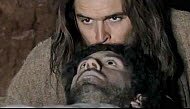
The scene of Jesus raising Lazarus from the dead was really odd. Rather than standing outside of the tomb and calling Lazarus to come forth, our cinematic hero walks into the tomb with Lazarus, stands behind him, and kisses him on the head (which, to be honest, I found to be more than a bit creepy). Lazarus then opens his eyes, stands up, and hugs his sister, Martha. The triumphant trio proceed to walk out to greet the cheering crowd.
Nicodemus, pay your taxes.
The account of Jesus being questioned by the Pharisees and Herodians as to whether or not Jews should pay taxes to Caesar is recorded by all three synoptic gospels. Jesus responded by calling them hypocrites (Matthew 22:18). In the movie, it is Nicodemas who asks Jesus the question. Nicodemas? Really?
Omniscient? Not so much.

One of the oddities of this film is that on several occasions Hippie Jesus was surprised. He seemed to have premonitions throughout the film of future events. During his triumphal entry into Jerusalem, Hippie Jesus had a sudden and startling premonition of his coming crucifixion. It was as if up until that moment he had no idea what lay ahead of him. Nevermind that Matthew 20:17-19 records Jesus prophesying His own death specifically by crucifixion before His triumphal entry into Jerusalem recorded in the next chapter. Jesus repeatedly prophesied His own death. See Matthew 26:1‐2; Mark 8:31‐33; 9:30‐32; Luke 9:22‐27; 18:31‐34. He alluded to it in the parable of the rich man and Lazarus in Luke 16 and several times in John’s gospel between chapters 13‐17.
Hippie Jesus had another premonition, this one interrupting the Last Supper. The meal which up to this point had been joyful and seemingly carefree was suddenly interrupted when he had a vision of Judas betraying him into the hands of the Romans. Judas then did so, but did so reluctantly and only after Hippie Jesus talked him into it. His final premonition came just before His arrest. Peter assured Hippie Jesus that he would not fall away. Greatly relieved, Hippie Jesus enthusiastically embraced him in gratitude. His relief was short-lived, however, as during the embrace he had a premonition of his upcoming denial.
The portrayal of Christ being startled by these premonitions is not only adding to Scripture what is not there, but it also strongly insinuates that He was not omniscient. This is an attack on the Second Person of the Triune God. As the God-Man, Jesus retained all attributes of His deity even though He was incarnate. All of God’s attributes are essential to His nature. One of these attributes is His omniscience. To portray Jesus as lacking omniscience is to detract from the biblical doctrine of His deity. Jesus affirmed His omniscience in John 16:30-31. Some take Jesus’ statement in Matthew 24:36 as an indication that while incarnate He did not possess omniscience. Caution should be taken here, however, as such a position would contradict Jesus’ affirmation of His omniscience in John 16:30‐31. A full treatment of this statement is far beyond the scope of this work, but suffice it to say that rather than Jesus not possessing omniscience, He, on occasion, voluntarily emptied Himself of His divine prerogative simply to exercise some of His attributes.
Destruction of the Temple—a Bedtime Story
One of the more bizarre scenes in the movie is its portrayal of Jesus pronouncement of judgment on the Temple and its accompanying corrupt religion. In Mark 13:1-2, Jesus walked out of the Temple and prophesied that “Not one stone will be left upon another which will not be torn down.” This prophecy was literally and dramatically fulfilled in AD 70 when the Romans laid waste to Jerusalem and destroyed the Temple.
In the movie, Hippie Jesus is indeed walking out of the Temple, but as he makes this pronouncement of judgment he stoops down to a smiling 4 or 5 year old little girl and playfully pokes her in her tummy. The juxtaposition of such a playful and lighthearted demeanor with what was in reality a very grave and serious pronouncement of coming judgment was truly surreal.
The Crucifixion—Robert Schuller Style
In the movie, Hippie Jesus is carrying his cross on the way to Golgatha. As he progresses, his mother, Mary, falls down beside him in anguish. Hippie Jesus says to her, “Don’t be afraid. Everything is possible with God.”
Not only is this event foreign to the biblical record, it greatly diminishes the meaning of the cross. Absent from the film is any mention of the heinousness and gravity of sin. Any consequences of sin are portrayed as merely horizontal with no eternal perspective. Hippie Jesus’ words to Mary in this scene instantly reminded me of Robert Schuller’s theology of Possibility Thinking. Schuller holds that the Gospel is not about receiving the imputed righteousness of Christ through repentance and faith but rather about enhancing one’s self-esteem.
Only Way to the Father? Let’s Just Not Bother.
One of the distinguishing doctrines of biblical Christianity is that there is one Mediator between God and man, the Man Christ Jesus (1 Tim. 2:5) and that there is salvation in no one else (Acts 4:12). This bedrock and non-negotiable truth is conspicuously absent from “The Son of God” movie.
After the resurrection, but before their knowledge of it, Peter is portrayed as leading communion for the other disciples. As Peter is breaking bread and saying, “This is my body which is broken for you,” (nope, this isn’t in the Bible either—just in case you were wondering) Hippie Jesus appears behind him and says, “I am the way, the truth, and the life.” Period. Period! He conveniently and oh-so pluralistically left out the true Jesus’ immediately following words, “No man comes to the Father but by Me” (John 14:6).
There could be no legitimate reason for leaving out such a clear statement of the exclusivity of Christ other than this exclusivity is one of the chief complaints against biblical Christianity. The world says that it is not “loving” to make such exclusive claims to Truth when the biblical reality is that the most loving thing we can do is to tell people the Truth. If Mark Burnett and Roma Downey love Jesus and people as they claim, then why did they not love them enough to tell them this? Why did they not love, for example, Hindus enough to tell them that Jesus is not just another god to add to their many, but the only God through Whom they can be saved from eternal wrath? It’s not like Mark and Roma did not know the next line. They knew it. They just chose not to include it.
If you truly want to show people love, tell them the truth. If you want to show someone hatred, see that they are in error, know the truth, but say nothing about it.
Other Concerns
The above list is far, far from a comprehensive list of the biblical and theological errors of this film. The account of the woman caught in adultery, the feeding of the 5000, Jesus reading from Isaiah 61, His instruction to “Turn the other cheek,” His statement regarding John the Baptist, the (partial) quotation of John 3:16, etc., etc. were all riddled with errors. There was literally not a single scene in the entire production that was without glaring issues. Some will say that there is nothing wrong with taking artistic license in making a movie. I would agree with that—depending upon the subject matter.
The Psalmist, David, says of God, “You have exalted above all things Your Name and Your Word” (138:2, ESV). God has exalted His Name and His Word not above some things or many things—above all things. It is simply not possible to overstate how seriously He takes them. If someone wants to make a modern rendition of say, John Steinbeck’s The Grapes of Wrath or Herman Melville’s Moby Dick or any other work of secular literature, hey, I’m good with that. Knock yourself out.
But that is not the case here. The subject matter here is God’s full revelation of Himself to us, the God-Man Jesus Christ. The Alpha and Omega. The only Creator and Savior. Dear ones, we are not at liberty to take artistic (and theological) license with such things. They are too sacred. Too holy.
Let’s suppose, for the sake of argument, that this movie had been produced not by New Age Roman Catholics, but rather by Bible-believing Christians and that the man playing the role of Jesus was the very best actor with the very best of intentions. Let’s further suppose that we were to go see this movie in the theater and have Jesus Christ Himself walk in and occupy the seat next to us. I cannot imagine a scenario in which after the closing credits rolled and the lights came back on that the real Jesus would say, “You know, that guy got it right. He did real justice to Me, truly understands what I experienced, and accurately portrayed Me to a watching world.” Can you?
It’s a Small World After All
Even if you’ve never been to Disney World, chances are you know the theme song to one of the park’s most well known and beloved attractions, “It’s A Small World.” Chances are that simply by reading the above heading you have the song playing in your mind right now. It is one of those songs that, once stuck in your head, is notoriously and irritatingly hard to get out. Media is powerful.
One of the great dangers of this film is that for those who go into it thinking that they are about to view an accurate portrayal of the Son of God (this is, after all, how many evangelical celebrities have described it), for many of them, what they see becomes their picture of Christ. For them Hippie Jesus is how they picture the real Jesus. This is tragic and has, potentially, eternal consequences.
I tell people often in my preaching and teaching that it is not enough to believe in Jesus. Jehovah’s Witnesses believe in Jesus. Mormons believe in Jesus. Even Muslims believe in Jesus. The problem, though, is that they do not believe in the right Jesus. We must believe in the right Jesus. We must believe in the Jesus of the Bible. We must trust in the finished work of the real Jesus on the cross and repent from sins in order to have the righteous wrath of God removed from and the righteousness of the risen Christ imputed to our accounts. The Son of God film creates in our minds a different Jesus than the Jesus of the Bible. It creates an image of a false god in our minds and, therefore, is perilously close to—if not outright—violating the second commandment (Exodus 20:4-6). If we trust in a different Jesus then we are trusting in a different gospel and a different gospel does not save (Gal 1:6-9).
Concluding Thoughts
Mark Burnett and Roma Downey claim that they desired to make a movie honoring the Son of God, but, by distorting His character, taking Him out of context, and omitting His claims of exclusivity, they have not honored Him at all; they have denied Him. Let’s keep in mind, though, that Burnett and Downey are New Age Roman Catholics and, as such, are not regenerate. Their minds have been blinded by the god of this age (2 Cor. 4:4). They cannot see what they cannot see. God must reveal the Truth to them. Let us pray for their genuine conversion.
What is more troubling to me than the movie itself is that evangelical leaders who claim to believe in the authority and sufficiency of Scripture have so heartily endorsed it. That Word-Faith preachers such as T.D. Jakes, Joel Osteen, and Paula White endorse it should be no surprise. Though it certainly does not surprise me that Rick Warren endorsed it, he at least claims to be a preacher of the true Gospel. Rick Warren went so far as to say of the film, “Skip church and go see it. It is that important.”
About halfway through the film I began to wonder what my reaction would be if this had been a movie about my wife. I began to wonder what my reaction would be if Kathy was the main character, and she was misrepresented and her words distorted. I would not have stood for it. I would not have just remained silent. Why, then, would I remain silent given that it was not my wife but my Savior being disparaged on the silver screen for the consumption of the undiscerning masses? And so, I did not.
When the movie came to its merciful end and the lights came on, I stood up and turned to face the crowd (I was sitting at the front and so everyone was behind me). I said, “Ladies and gentlemen, may I please have your attention?” Every head in the theater turned and people stared at me. I went on to explain to them that they just saw a movie in which Jesus was grossly misrepresented and His teachings twisted beyond recognition. I said, “Please do not think that you just saw the Jesus of the Bible in this movie, because you did not. What you just saw was a different Jesus with a different gospel.” I went on to present the true Gospel to them. I talked about sin, the wrath of God and the absolute necessity for genuine repentance. I said that salvation is by grace alone through faith alone in Christ alone. I ended by saying, “Please do not think you will find the true Jesus in this movie or any other movie. If you want to know the true Jesus, please, please go home and read your Bibles. There and only there will you find Him.”
I guess I spoke for 3-4 minutes or so. I noticed that as I spoke the vast majority of people looked like deer in headlights just watching me in stunned silence. A few, though, were nodding their heads in agreement. For just a few, it seemed that what I was saying was resonating with their hearts and minds.
I relate this to you not to lift myself up as some courageous Christian. Not at all. I only did what I was supposed to do. My conscience was so violated by this film that for me to do anything less would have been sin. I did it because it was right thing to do. James 4:17 states,
“Therefore, to one who knows the right thing to do and does not do it, to him it is sin.” Any decent husband would have defended his wife and so why would we not likewise defend our Savior?
This movie, like its theatrical predecessor of a decade ago, is being billed as one of the greatest evangelistic tools of all time. Dear friends, I would submit to you that it is the Word of God empowered by God’s Holy Spirit that is the greatest evangelistic tool of all time. Movies such as this undoubtedly move us and tug on our heart strings, but they are the theological equivalent of a sugar rush. They give us a brief emotional high but then leave us to come crashing back down.
Recall the account in Luke 16 of the rich man languishing in the place of torment begging Father Abraham to send Lazarus to warn his five brothers back on Earth not to come to this place. Abraham responded, “They have Moses and the prophets. Let them hear them.” The rich man retorted, “No, Father Abraham, but if someone goes to them from the dead, then they will believe!” Abraham said, “If they do not listen to Moses and the Prophets, they will not be persuaded even if someone rises from the dead.” In other words, if the rich man’s brothers will not respond to the written authoritative Word of God, they will not respond even if someone were to come to them from the dead.
This movie is, in my estimation, a reflection of the pitiful state to which we as professing believers have slid. We seem to yearn for Hollywood to somehow validate our theology and values. It’s as if we are saying to the world, “See, Jesus really is cool, and we really aren’t kooks! See how popular these films are?” We are like the kid on the playground who nobody wants on his team but desperately desires to be included. Pitiful. Why do we need validation from a lost world and depraved culture that is warring against God? We are the redeemed of the Most High God empowered by His Holy Spirit. Why is it that we seem to get so excited and worked up over a theologically and biblically inept Hollywood production when we have the Alpha and Omega as our Head?
There is an inherent power in the word of God—the Bible—that is found nowhere else. Not in movies, not in passion plays, not in skits, and certainly not in church services which pander to the supposed “felt needs” of the lost. We have traded in the big guns of Scripture for the spitballs of visual entertainment. The Apostle Paul said, “For I am not ashamed of the Gospel of Christ, for it is the power of God unto salvation for everyone who believes, to the Jew first and also to the Greek” (Rom. 1:16). If you truly want to see the power of God unleashed, take the Gospel as it is read in and preached from the Bible out to a lost world and trust the Holy Spirit to convict of sin, righteousness, and judgment. Trust Him to bring life to the spiritually dead. That, dear ones, is the power of God.
See list of Relevant Issues—questions-and-answers.


Still be aware of inaccuracies and liberties (e.g., Jesus was not convicted at the initial trial of Caiaphas, that is why he was taken to Pilate, who was no fool).
Moral rating: Better than Average / Moviemaking quality: 3½
Moral rating: Excellent! / Moviemaking quality: 4
Granted, I do think that Jesus saying, “I am the way, the truth, and the love,” was taking a liberty, but can’t you make the claim that to have life you must have love? Wasn’t it God’s love that sent Jesus Christ to save us from the second death (hell)? Wasn’t it the Father’s love that created (breathed life) into Adam and Eve in the Eden? Love is instrinc with life. You cannot live in the proper sense without love. You can exist, like the monkeys and other animals, but with love you actually live. See all »
Moral rating: Excellent! / Moviemaking quality: 4½
As for the “inaccuracies” ok, so the movie reworded. The delivery may have been different, but is the message behind it not the same? Case in point, the woman caught in adultery. So, it’s not word for word the same, but is the message different? At least they keep to the spirit of the Word. Is that not laudable? Are we so legalistic that we have to take shots at a movie that portrays the life of the Savior and doesn’t contradict what is written? Do a few omitted words really make it a different gospel? See all »
Moral rating: Good / Moviemaking quality: 4
2. At the raising of Lazarus, Jesus goes into the tomb instead of standing outside and shouting “Lazarus, come forth!” See all »
Moral rating: Good / Moviemaking quality: 3
The miracles of Jesus are shown. I don’t know any “New Agers” who believe in Jesus as the chosen messiah. Nor do I know any “New Agers” who believe that the miracles of Jesus are historically correct. This movie makes clear that the miracles of Jesus were historically correct.
Moral rating: Excellent! / Moviemaking quality: 5
Moral rating: Better than Average / Moviemaking quality: 4
Also, the guarded tomb is only reported in Matthew, so unnecessary for Biblical accuracy, IMHO. One could pick this apart for a few Biblical errors, but I think the overall Jesus story comes through clearly. All of the acting was good. I loved the way Peter’s betrayal was staged, and John’s final scene with Jesus was very moving. See all »
Moral rating: Better than Average / Moviemaking quality: 4
I still think it’s good to remember the inmense sacrifice that God in person had to endured in His love for us by being slain and shedding His blood on that cross for our salvation. Worth seing it with the understanding of the Hollywood taste and lack of important biblical information and writting.
Moral rating: Good / Moviemaking quality: 4
Moral rating: Good / Moviemaking quality: 2½
Moral rating: Good / Moviemaking quality: 3
Negatives • Liberties taken with the gospel readings. The woman caught in adultery and the raising of Lazarus being the prime examples. I note that all 3 times that I heard John 14:6 I heard “life” not “love” as other people have said. • Horrible computer graphics of Jerusalem (distance shots). You definitely knew you were looking at something faked. • Calling of Peter without Andrew, James, and John. Skipping “Get away from me Lord for I am a sinful man”. • Having only 10 or so people judging Jesus. The Sanhedrin wasn’t that small.
Other: None should complain too much regarding the lack of episodes during Jesus” ministry. A 2 hour movie doesn’t have the same amount of time to deal with things as does a Jesus of Nazareth miniseries.
Moral rating: Excellent! / Moviemaking quality: 2½
In this movie, no angel greets Mary to declare the miracle, no angels announce the Messiah's birth to the shepherds, no angels at the tomb ask Mary why she looks for the living among the dead and proclaims that He is risen. Made me think of when Paul (in Galations 1:6-12) strongly warned about those who would pervert the gospel of Christ and warned about men who would teach another gospel. When asked about the signs and times of his return, his (second) coming (in Matthew 24) Jesus answered, Take heed that no man deceive you.
With Scripture twisted, and so little in this movie that would persuade people that Jesus is the Son of God, I wondered what was the real reason that they made it the way they did.
Moral rating: Average / Moviemaking quality: 3
The one scene I did like was when the Jews protested unto Pilate, the Roman procurator of Judea, that he had used the Temple money to bring a stream of water to Jerusalem, and he ordered his guards to conceal daggers underneath their clothing, and at a given signal, a massacre ensued. That was taken out of Antiquities of the Jews, written by Flavius Josephus, a Jewish historian who lived from 37-100 A.D. Even that scene, though, was badly done, in my opinion.
And the key verse was taken from an inferior translation of the Bible. The correct reading is “For God so loveth the world, that He hath given His only begotten Son, that whosoever believeth in Him, should not perish, but have everlasting life.” —The Holy Gospel of Jesus Christ According to John 3:16.
The word begotten is critical to the understanding of the text, and is taken from the Greek word monogenes, which has 2 meanings, which you can look up on sny search engine, and it will guide you to an appropriate website.
To the inaccuracies the reviewers listed, I must add that Jesus’ baptism was only partially shown, and the Holy Ghost coming on Him in the form of a dove was omitted.
One more thing, if I may: John didn’t look burned when he was on the island of Patmos. History records that John was boiled alive in oil during the reign of the Emperor Domitian, but he survived, and was exiled to the island of Patmos. He was then freed in 97 A.D. and died in Ephesus in 99 A.D.
I do NOT recommend this film version of Jesus’ life. However, if it does get people to actually read the Bible, all well and good. Laud be unto the Father, who liveth forever and ever. Amen.
Moral rating: Excellent! / Moviemaking quality: 3
1. The movie feels like a television movie with the chopping scenes to allow for commercials.
2. The errors are numerous, from misquoting the Bible to representing Thomas as a blue eyed almost shaved blond hair, to having the crowd dressed with Arab turbans…
3. For a movie portraying the life of Jesus, many crucial moments of His ministry were absent, such as when the Holy Spirit descended on Him after being baptized, or when ascending to Heaven after giving the Great Commission…
A movie trying to capture the life of our Lord and Savior Jesus Christ should be done with love and passion, instead of using it as an additional venue to make money from something originally made for television.
Moral rating: Good / Moviemaking quality: 2½
Moral rating: Average / Moviemaking quality: 3
Thus the movie was not totally accurate compared to my beliefs of what happened according to the Bible. So please be sure you know these things before you go see a movie just because it mentions it’s based on something from the Bible.
As a Catholic, I apologize for the ways in which the movie erred, and ask that you please not allow it to tarnish your view of us. If you want a accurate view on Christ’s life, (and quite a moving one, too) I highly suggest the Passion. I know it’s made by yet another Catholic, but thousands of Christians, Catholics and Protestants alike have greatly enjoyed it. May God bless you and keep you.
PLEASE share your observations and insights to be posted here.



Understanding they had a limited timeslot and had to select major events only, but why did they re-write dialog and important conversations recorded in the Bible? Why alter events? Just a few out of many examples:
• Why were there no guards at Jesus” tomb?
• Why does Jesus walk through an open door to the apostles in the upper room?
• Why is Judas the only disciple emphasized to be Jewish… and portrayed as an argumentative Pharisee? Jesus and all the apostles were Jewish.
• Why does Jesus say he is “the Way, the Truth, and the Love”?
• Why does Jesus go into Lazarus” tomb alone with Mary instead of publicly praying and calling Lazarus to come out?
• Why does the High Priest, Caiaphus, say something made up rather than “It is better that one man die…”
• Why did Jesus simply disappear from the Mount of Olives instead of ascending?
If they had to be selective, why is so much film time spent and embellishments made on one line events, such as Pilate’s wife’s dream, yet miracles and teachings of Jesus left out (but clearly filmed, as shown in the little box alongside the credits).
Very puzzling. Generally a good depiction, and a great opportunity for believers to invite unbelievers. But especially because of that, throughout the film I kept asking myself, “Why did they change that… and that… and that?” Just because it is a film about Christ made by Christians are we not to say anything? If this film were faithfully, completely Biblically accurate, it would be excellent.
My Ratings: Moral rating: Good / Moviemaking quality: 3½